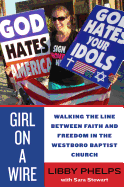
Libby Phelps's surname is synonymous with the notorious Kansas Westboro Baptist Church founded by her grandfather Fred. Members' daily demonstrations targeted Gay Pride parades as well as American soldiers' funerals. "I had been picketing since I was eight years old," Libby recalls in her memoir, Girl on a Wire. She wrote it after fleeing her family, their church and the bizarre life she'd lived for her first 25 years.
Individuality was anathema to Westboro--90% of the 70 congregants were members of the Phelps family. Libby suppressed any intellectual curiosity. She adored her grandfather, a self-proclaimed prophet whose message that God hates America for tolerating gays never diminished his role as her loving Gramps in her young mind. Bible study, communal chores and picketing framed the Phelpses' days. Shirkers were scorned. "I was constantly worried I wasn't good enough to be one of God's elect," Libby writes, and she was terrified of eternal damnation. The church encouraged academic success, however, so Libby and her cousins were relativity free during school, and Libby eventually earned a Ph.D. in physical therapy.
Aunt Shirl was Westboro's enforcer, and her lifelong sniping at Libby culminated in an "intervention" staged when Shirl objected to Libby's "indecent" swimsuit. Through a tearful, painful realization afterward, Libby enlisted sympathetic co-workers, packed and fled. "I was walking the tightrope between faith and freedom. It was time to cut the wire."
Privacy was nonexistent at Westboro, so Libby was afraid to keep a journal. Nevertheless, her recollections are clear and detailed, providing insight into an oppressive and hateful community. --Cheryl Krocker McKeon, manager, Book Passage, San Francisco

